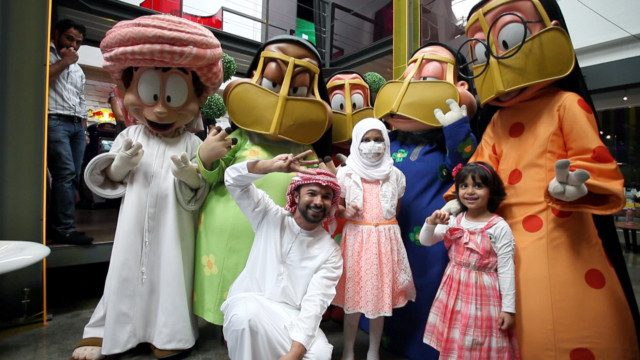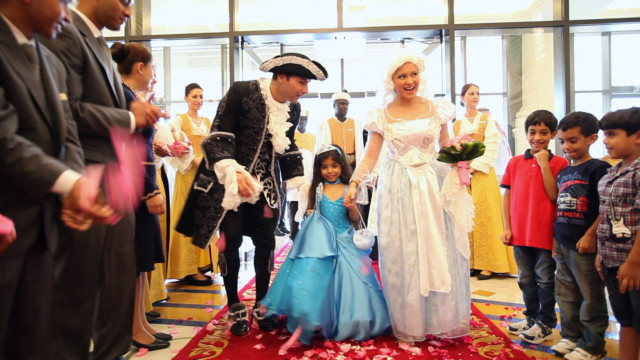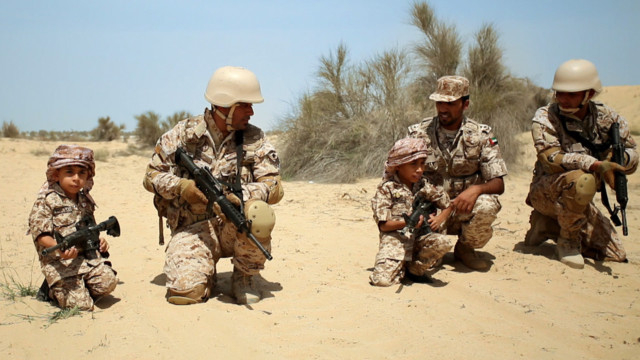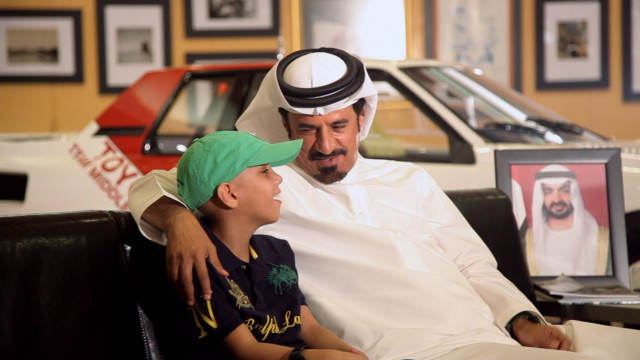
‘Charity begins at home’ is a phrase that does not apply to Shaikha Shaikha Bint Saif Bint Mohammad Al Nahyan, as her voluntary and charitable work targets the globe and all those who need to be helped and assisted at home and everywhere else.
In our Arab culture, charity is one of the highest virtues and is considered a means of cleansing oneself spiritually and materially.
Throughout the conversation with Shaikha Shaikha it was evident that charity for her is a way of life, through the Make-A-Wish Foundation and the Emirates Thalassemia Society.
She is a multi-talented woman who is interested in arts and heritage through the myriad Emirati traditions.
In her perception, each commitment stems from passion, and she is passionate about history in general, and peoples’ cultures, heritage and arts, especially as she grew up in an environment which pays attention to these details.
Shaikha Shaikha believes that one does not have to be rich to be charitable. To her, “a good word is charity”, “a smile is charity”, and “removing obstacles from the path of people is charity”.
Young and old, rich and poor, the butcher, the baker, the candlestick maker — all are encouraged to join in the practice of sharing and caring.
Weekend Review asked Shaikha Shaikha about the Make-A-Wish Foundation; she pointed out that the UAE branch is a part of Make-A-Wish International. It is concerned with fulfilling the wishes of children of citizens and residents (ages 3 to 18) with life-threatening conditions. She added: “Through our purely humanitarian mission we seek to instil hope in their lives. We do not offer them a painkiller, but we work to put a smile on their faces, and try to restore some of the hope, serenity and tranquillity that they have lost. This has been the activity of the foundation since 2004, when Make-A-Wish was inaugurated in the UAE. Make-A-Wish won the Local Foundation of the Year award, which was received as part of the Middle East Philanthropy Awards 2013, held in Abu Dhabi. This is proof of the status attained by the foundation during its short life and the trust it has earned from supporters and society.”
Special memories
On the cases she has seen over the years at the Make-A-Wish Foundation, she said, “We have dealt with a large number of cases, and there have been many touching ones. It is extremely saddening for anyone to hear that a child is suffering from a particular illness. So you can imagine what it is like as we deal with these children and fulfil their wishes which are often simple but very important to them and to their families.”
Shaikha Shaikha added, “Every child whose wish was granted by the foundation has touched our souls and has stayed in our memories, especially as we are dealing with people who suffer from difficult, intractable and very painful conditions. We are fully aware that we are not dealing with numbers, but with young people whom we have to care about.
She also pointed out that “it is our duty towards them to make efforts to make them happy. What perhaps hurts us most is that Make-A-Wish cannot realise the wish of a child who wants to travel to some place in the world because of his poor health. For example, the trip of a child to Disneyland was delayed because of her severe illness, and another child was not allowed by doctors to travel, so we had to meet his second wish.
One of the wishes granted by the foundation was to secure a meeting for a child called Shehab with his role model His Highness Shaikh Mohammad Bin Rashid Al Maktoum, UAE Vice-President, Prime Minister and Ruler of Dubai. A child named Safiyah met General Shaikh Mohammad Bin Zayed Al Nahyan, Crown Prince of Abu Dhabi and Deputy Supreme Commander of the UAE Armed Forces. Umayr played a policeman and met Lt General Shaikh Saif Bin Zayed Al Nahyan, Deputy Prime Minister and Interior Minister. Isa visited Sir Bani Yas Island and met Dr Shaikh Sultan Bin Khalifa Al Nahyan, Adviser to His Highness the President of the UAE.
Mirah, a Thalassemia Centre patient, was crowned “Snow White” princess for one day. We also fulfilled the wish of Sara, who is afflicted with leukaemia, taking her to Disneyland. The foundation realised the dreams of brothers Faisal and Nasser by getting them on board an aircraft with the Knights Aerobati Display Team. Umar met wrestler John Cena in Abu Dhabi, in coordination with the World Wrestling Federation.
Ahmad went on an Umrah trip with singer Sami Yousuf. Lamiaa became a television director and participated in production of Khatwah (Step) show on Abu Dhabi TV station. Manal became a doctor, Nidal a firefighter, Rahma Cinderella, and Ubayid an army officer. Sultan met Ricardo Oliveira, the striker of Al Jazira Club, Abdul Rahman met Hussain Al Jasmi, Mohammad Hadi met the Indian star Shah Rukh Khan, Asma met Freej characters, and Yousuf met Mohammad Bin Sulayem.
Since the establishment of Make-A-Wish, many wishes have been fulfilled. Wondering about the proportion of voluntary work at the foundation and how significant it is for such an important institution as Make-A-Wish, Shaikha Shaikha said that up to this moment “we have realised more than 1,000 wishes. In the middle of last month, December, we celebrated the achievement of wish number 1,000. Most of the wishes were fulfilled between 2009 and 2013. In 2008, seven wishes were granted, and in 2009 the number of wishes met went up to 26, but in 2010 we made a quantum leap to 135 wishes. The number of wishes realised after just one year reached 139, and in 2012 a total of 442 wishes were granted, a large number compared with previous years, 322 of them inside the UAE and the rest abroad.
The Make-A-Wish team worked hard in searching for cases and registering their wishes. As for the team, they volunteer their effort, time and expertise for the sake of a noble humanitarian goal. “Each volunteer who works with us is a win for us and supports the idea of voluntary work in UAE society. This is what UAE institutions have been calling for and working to strengthen and organise for several years,” Shaikha Shaikha said.
She also pointed out that the foundation now has more than 20 volunteers from various parts of the country, and from many nationalities and age groups. Some of them meet the children, some work in hospitals (nurses and doctors), some are journalists, and some are organisers and managers of events. “The proportion of females is 60 per cent, but we cannot talk about the role of females in isolation, for both men and women are involved in this work, which is a noble message to all members of society.”
They help us, she added, each according to their speciality, potential and experience, starting from the Board of Directors. In addition to these active volunteers, there are volunteers who work with us during certain times of the year, apart from the services provided to us by Takatof Foundation when needed.
“We fulfil the wishes of all children in the UAE, including citizens and residents,” Shaikha Shaikha said.
“This is the message, vision and strategy of the Foundation. We have granted the wishes of children of 30 nationalities inside the country, but this does not at all mean we stop at achieving the wishes within the UAE,” she added.
“Every now and then we join forces with the branches of the foundation located in different places of the world to fulfil the wishes of other children. We have fulfilled 60 wishes in India, 30 in the Philippines and 30 in Pakistan. This was to implement the decisions taken at the global conference of Make-A-Wish International, which was held in 2011, in Dublin, Ireland. The foundation also committed itself to fulfilling the wishes of children in Pakistan and continuing to provide support for a number of countries. To date, as I said, we have granted more than 1,000 wishes, and we are still continuing to do so,” she said.
“The TV show Granting a Wish which was broadcast in Ramadan 2013 on Abu Dhabi TV and Emirates Channel helped a lot in fulfilling hundreds of wishes. Here I would like to thank all government and private institutions, bodies, associations and companies that helped us and still help us a lot, as well as the individuals who do not stop supporting us, whether by realising whole wishes or by donating through SMS. We receive donations daily, even from schoolchildren and university students. All donations go to the Wish Granting Fund,” she said.
The role of women
“The leadership of the country created all the circumstances and means that support the renaissance of women, and ratified all international, regional, Arab and local pieces of legislation supporting women which are not inconsistent with the values of UAE society. The leadership has also provided a solid grounding based on education from where the Emirati woman can proceed to all fields of life.
“The success of the Emirati women did not come out of nothing, as what our wise leadership has offered in this area is very important. And here we have to recall the role of the late father of the nation Shaikh Zayed Bin Sultan Al Nahyan, may God grant him mercy. Once in power, he had begun to emphasise the importance of women’s education and then their participation in work alongside men, especially in the fields of bringing up children and education. Today, His Highness Shaikh Khalifa Bin Zayed Al Nahyan — may God protect him — is continuing to follow and support this policy.
We should mention here the constructive and outstanding role played by the UAE Women’s Renaissance Association, which later became the Family Development Foundation, chaired by Her Highness Shaikha Fatima Bint Mubarak — may God protect her.
Shaikha Shaikha is also a member of the Board of Directors of the Thalassemia International Federation, Chairperson of the Board of Directors of the Emirates Thalassemia Society.
She said that the Emirates Thalassemia Society was established in October 1997 by a ministerial decree from the Ministry of Labour and Social Affairs to help people with thalassemia medically, morally and socially. The aim was also to communicate with similar international associations and institutions with the purpose of exchanging information and expertise, and to encourage and follow up medical and therapeutic research related to thalassemia. This is in addition to the preparation of educational programmes to control the spread of the disease, in collaboration with concerned quarters, encouraging blood donation, and educating and advising couples to undergo prior medical check-ups. The society also encourages patients to become productive individuals and invites associations, institutions and organisations in the state to provide financial and moral assistance to them in accordance with the provisions of the law.
She said, “Before I became chairperson of the Board of Directors of the Emirates Thalassemia Society, I had been in direct and constant contact — for more than eight years — with thalassemia patients through the Make-A-Wish Foundation. When the elections of the society’s Board of Directors met, I was elected unanimously by the General Assembly of the Emirates Thalassemia Society. It is an election held under the direct supervision of the Ministry of Social Affairs, and I consider being chosen for this task a great responsibility. I hope God Almighty will make me successful, especially as the society is in charge of caring about thalassemia patients in the UAE. The number of constant beneficiaries of the Society’s services has reached more than 1,000 patients.”
She added, “One of the things done by the society is the conducting of several bone marrow transplant operations [stem cells] for patients of different nationalities. The Emirates Thalassemia Society has provided Dh500,000 as part of the “Social Support” programme it has launched for the benefit of thalassemia patients in different emirates, and has donated iron centrifugal pumps and medicines for patients.”
Shaikha Shaikha then focuses on the initiatives for the benefit of thalassemia patients in the UAE. “The state has adopted programmes designed to curb the spread of thalassemia, and within this context, the society joined the Thalassemia International Federation [TIF], and in 2012 the first regional office of the TIF outside of Cyprus was opened in Abu Dhabi. This was to strengthen cooperation with local and Arab health institutions and organisations and develop the area of treatment of blood diseases. There was a keenness to apply the principles and recommendations of the regional office on the treatment of thalassemia and the other blood-related diseases, and to design special programmes to control the spread of the illness in the region. In the first phase services will be provided to some Gulf states,” she said.
In partnership with the TIF, the first international award, the Sultan Bin Khalifa International Thalassemia Award was created to support institutions and individuals operating in this field locally and internationally, and encouraging the development of research and services provided for thalassemia patients. In its first edition in 2013, there were eight winners in the category of international awards, and 19 winners in the category of local awards, including scientific and medical institutions, doctors, technicians, nurses, patients and their families, and those who support them financially and morally.
The Sultan Bin Khalifa Al Nahyan Humanitarian and Scientific Foundation has set up a thalassemia centre in Fujairah. The centre serves 86 patients, with an estimated cost of treatment between Dh50,000 and Dh200,000 per year, and of nearly Dh1 million for patients who undergo marrow transplant operations outside the country.
“The UAE is marked by the quality of service it provides for thalassemia patients; it is comparable to the most advanced countries in this field. All of this would not have been achieved without the approach of our wise leadership represented by His Highness Shaikh Khalifa Bin Zayed Al Nahyan, may God protect him,” Shaikha Shaikha said.
The foundation also hosted this year the largest two international conferences on thalassemia. The Thalassemia International Federation World Congress (TIF 2013), the biggest conference in the world, was attended by about 3,000 experts to discuss the latest developments and learn about the state-of-the-art technologies related to thalassemia and haemoglobin disorders. Abu Dhabi was chosen to host the 13th edition, thanks to the efforts of the Sultan Bin Khalifa Al Nahyan Humanitarian and Scientific Foundation in raising awareness among the public about the disease.
On the sidelines of the conference, the first TIF’s first ever global exhibition was held, with the goal of exchanging international expertise for the benefit of thalassemia patients, providing necessary social support for them, and exchanging ideas about ways to avoid and guard against the illness. It was attended by 30 organisations and 16 local, regional and international associations concerned with providing care for people with thalassemia. The exhibition brought together various medical and scientific communities, pharmaceutical companies, national and regional organisations, doctors who specialise in thalassemia, and patients suffering from the disease from all over the world.
Abu Dhabi also hosted the 15th edition of the Thalassemia International Federation World Congress, which was held under the patronage of General Shaikh Mohammad Bin Zayed Al Nahyan, Crown Prince of Abu Dhabi and Deputy Supreme Commander of the UAE Armed Forces. The latest methods of treatment and organ transplants were discussed at this conference dedicated to patients and their families.
Recognised for her services
Shaikha Shaikha has won the award for the most prominent international figure in the fields of health services in society, education and research. She said: “It was the UAE that won the award, and this is how I look at it. I represented my country, which managed to win recognition in the field of health services, education and research. Therefore, this award has been added to the awards won by the UAE.”
Asked if there are plans to create a blood bank for thalassemia patients, she pointed out that in the UAE, there are many centres overseeing this task, and they are highly advanced, including the Abu Dhabi Blood Bank, the Dubai Blood Donation Centre, and Sharjah Blood Transfusion and Research Centre, as well as the centres linked to blood diseases, such as the National Centre for the Diagnosis of Haemoglobin Diseases.
These centres not only provide blood units for thalassemia patients, but also conduct research to reduce transmission of viral diseases through blood transfusion.
She also said that “I can say that the response to any blood donation campaign is currently good compared with previous periods, and there are donation campaigns going on throughout the year. One of the most important calls for donation has been from His Highness Shaikh Mohammad Bin Rashid Al Maktoum, Vice-President and Prime Minister of the UAE and Ruler of Dubai. He urged the institutions, departments and individuals to donate blood for the benefit of thalassemia patients and road accident victims periodically and continuously. This invitation was answered by the crown princes, Shaikhs, many public figures and a large number of individuals.
“Also, recently the second edition of the ‘Dami li watani’ (My blood for my country) initiative was launched according to the directives of Shaikh Hamdan Bin Mohammad Bin Rashid Al Maktoum, Crown Prince of Dubai and Chairman of the Executive Council, which aims to collect blood donations for the benefit of thalassemia patients. But we are still suffering from a lack of blood in the month of Ramadan and the summer period. That is why it is necessary that the voluntary donation continues in those two periods, as is the case for the rest of the year. Thalassemia patients consume annually between 40 per cent and 45 per cent of the blood units in the blood donation centres, the equivalent of 20,000 units of blood.”
About the activities, competitions, and awards organised by the Emirates Thalassemia Society, she said that the social activities come in the context of serving thalassemia patients, and raising awareness of the necessity of donating and volunteering for the benefit of thalassemia patients.
The society supports the patients who are students financially and educationally, and provides them with teachers in case they have to be absent from school due to illness, and qualifies patients for integration in the labour market by involving them in training sessions. The society provides subsidies for the needy families of patients.
In addition, the society organises awareness campaigns in various institutions in the country, and periodical check-ups for employees and customers and educates them on the importance of these checkups, which contribute to the reduction in the cases of this disorder. This is supported by the distribution of brochures, posters and booklets, and campaigns for raising awareness about the importance of blood donation for thalassemia patients.
In collaboration with the Sultan Bin Khalifa Humanitarian and Scientific Foundation, the society employs jobless patients, either in-house or at the various institutions in the UAE.
The society provides public lectures and awareness campaigns, some of which are for entertainment. This is done in collaboration with government and private sectors, but we still have to work very hard for spread awareness in UAE society about thalassemia and the need to support and assist the patients.
The Emirates Thalassemia Society also announced a campaign (“For my tomorrow I shall have my blood checked”), in cooperation with the Zayed Bin Mohammad Family Gathering in Al Khawaneej, Dubai. The society also launched the “What is Thalassemia?” competition, which it organises in collaboration with the two Ministries of Education and Higher Education and Scientific Research, as well as the Abu Dhabi Education Council, with the purpose of raising health and cultural awareness about thalassemia among students and parents, and encouraging young people to undergo a medical examination before marriage. Valuable financial awards were instituted to encourage students to innovate and design methods to increase awareness to curb the spread of the disease.













